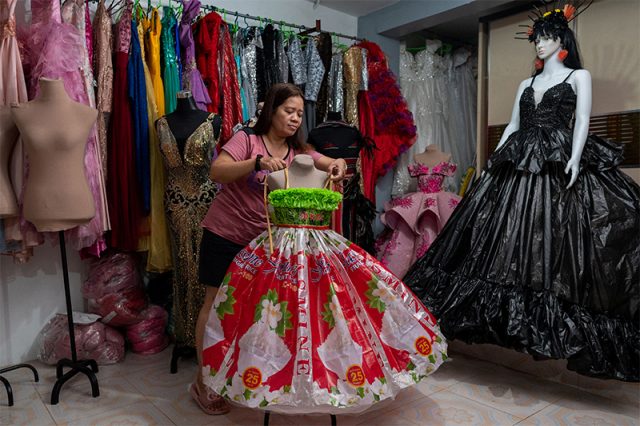
CAINTA, Philippines — Lenora Buenviaje has been making dresses out of waste materials for the past seven years and says wearing clothes made from such items as recycled newspapers, plastic wrapping and rice sacks can be both economical and fashionable.
Using a foot-operated sewing machine, the 51-year-old Philippine seamstress stitches and weaves plastics and other materials into inventive and fashionable frocks and gowns, sometimes completed by headdresses.
“The bubble wraps from delivery packages are nice looking and make for a good design, especially the black and white wraps,” she said.
White wraps were good for making fairy or wedding gowns, she said.
The dresses sell for between $30 to $50 and are used for everything from debuts – a coming-of-age party for a woman’s 18th birthday – to weddings.
In Asia, there is plenty of waste material for Buenviaje to work with: About 80% of global ocean plastic is estimated to come from Asian rivers, and the Philippines alone contributes a third of that, according to a 2021 report by Oxford University’s online publication, Our World in Data.
“It’s important to recycle or utilize used materials so we can help our earth,” said Buenviaje client Lalaine Alcalde. The recycled material used for each dress depends on what her clients are looking for, said Buenviaje, who lives in Cainta, about 15 km (10 miles) east of Manila.
Her gowns are sometimes used in beauty contests and pageants, she also said. “I get delighted whenever they win, the designs are simple but they still win.”
Buenviaje hopes in-person fashion shows and competitions that were halted during the pandemic will soon resume.
She also aims to organize fashion events herself to showcase and inspire others to create clothing out of recycled materials.
—Reporting by Adrian Portugal; Editing by Ed Davies and Tom Hogue









